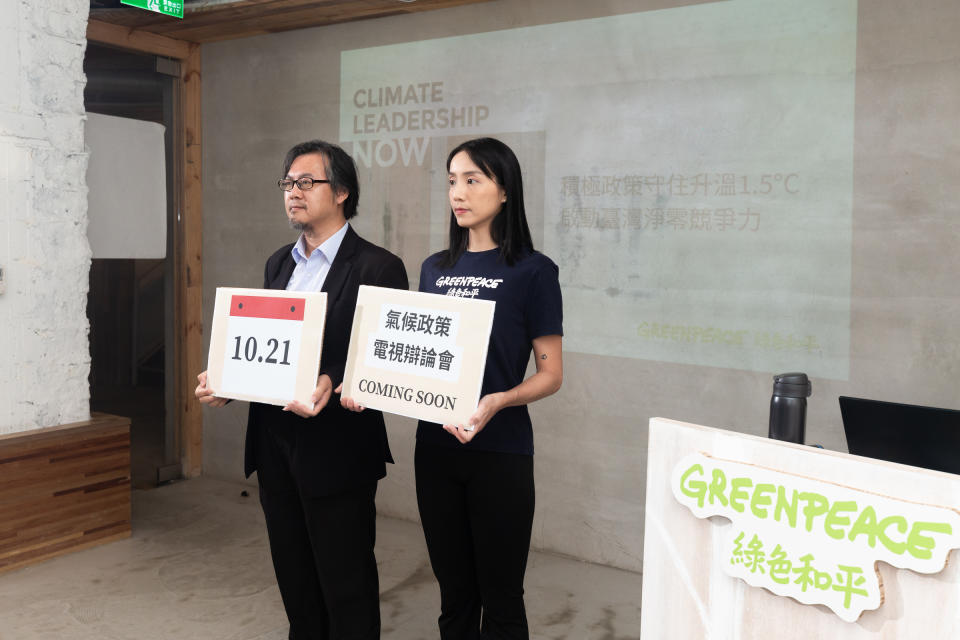Groups Announce First TW Presidential Climate Debate Urging Candidates to Set Ambitious Renewable Energy Target
Taipei, 31st August 2023- In advance of the 2024 presidential election, Greenpeace East Asia held a press conference today to release "Maintaining 1.5°C Warming: Climate Leadership Policy Blueprint" (《守住升溫 1.5 度 C:氣候領袖政策藍圖》), a proposal for presidential climate policies. Greenpeace urges the candidates to raise the renewable energy goal to at least 40% by 2030 and prepare for Taiwan’s first Climate Debate on 21st October.

"Taiwan is playing catch up when it comes to climate action. The acceleration of renewable energy development and enhancing international competitiveness for businesses will be crucial challenges for the future president." said by Greenpeace Taipei’s climate campaigner Lena Chang.
Greenpeace East Asia Taipei office pointed out that three candidates are sloppy in their response to the climate emergency. Despite the fact that Taiwan’s government has included the net-zero goal in the "Climate Change Response Act", none of the candidates have yet proposed their 2030 emissions reduction goal. As for renewable energy, Lai Ching-te (賴清德), the presidential candidate of the ruling Democratic Progressive Party (DPP), has put forth a conservative target of 30%, with the intention of continuing the existing policies. On the other hand, Hou You-yi (侯友宜), from the opposition Kuomintang (KMT) has proposed a goal of 27%, yet the associated policies remain absent. As for Ko Wen-je (柯文哲) from the Taiwan People’s Party(TPP), no explicit 2030 renewable energy goal has been presented.
Greenpeace also evaluated candidate policies in three areas, including "Diverse Green Energy", "Net-Zero Soft Power", and "Protecting Natural Carbon Sinks". It is disappointing that none of them proposed policies that help guide businesses in producing green energy, promote citizen power plants with shared benefits, or protect forests and oceans as natural carbon sinks.
"To overcome the obstacles in Taiwan's renewable energy advancement, a proactive policy approach is essential. Taking examples from the US and EU, the government could encourage green energy consumption and self-use among businesses through subsidies and incentives. Enterprises that own or invest in solar projects could get proportional tax credits. Taiwan should implement such policies toencourage major electricity consumers to actively participate in the green energy market, thereby further increasing the overall share of renewable energy in Taiwan's energy mix."said Chang.
A Taiwanese poll from this year suggests that over 60% of the population believes climate change should be the core policy of parties or politicians. The International Climate Development Institute and the Energy Transition Promotion Alliance will jointly host Taiwan's first climate debate on 21st October, providing a platform for presidential candidates to discuss their net-zero policies in-depth. Zhao Gongyue, CEO of the International Climate Development Institute, stated, "Currently, candidates nominated by three parties have agreed to attend the climate debate. We are waiting for reply from other candidates. Observing international election trends, more and more voters are concerned about climate issues, leading to presidential policy debates focused on climate. Through this event, candidates will have opportunities to elaborate and clarify their climate policies."
The post Groups Announce First TW Presidential Climate Debate Urging Candidates to Set Ambitious Renewable Energy Target appeared first on Greenpeace 綠色和平 | 臺灣.

 Yahoo奇摩新聞
Yahoo奇摩新聞 